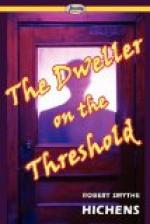He spoke the last words with a sort of lamentable energy.
“Such a gentle, yielding man as he was!”
“It was just that. He came under my influence at once, and showed it in almost all he said and did. He looked up to me, he strove to model himself upon me, he almost worshiped me. One evening,—it was in the pulpit!—the idea shot through my brain, ’I could do what I like with that man, make of him just what I choose, use him just as I please.’ And I turned my eyes toward the choir where Chichester sat in the last stall, hanging on my words. At that instant I can only suppose that what people sometimes call the maladie de grandeur—the mania for power—took hold upon me, and combined with my furtive longing after research in those mysterious regions where perhaps all we desire is hidden. Anyhow, at that instant I resolved to try to push my influence over Chichester to its utmost limit, and by illegitimate means.”
“Illegitimate?”
“I call them so. Yes, yes, they are not legitimate. I know that now. And he—but I dare not think what he knows!”
The rector was greatly moved. He half rose from the bench on which they were sitting, then, making a strong effort, controlled himself, sank back, and continued:
“At that time, in the early days of his association with me, Chichester thought that everything I did, everything I suggested, even everything that came into my mind, must be good and right. He never dreamed of criticizing me. In his view, I was altogether above criticism. And if I approached him with any sort of intimacy he was in the greatest joy. You know, perhaps, Mr. Malling, how the worshiper receives any confidence from the one he worships. He looks upon it as the greatest compliment that can be paid him. I resolved to pay that compliment to Henry Chichester.
“You must know that although I had entirely given up the occult practices—that may not be the exact term, but you will understand what I mean—I had indulged in at Oxford, I had never relaxed my deep, perhaps my almost morbid interest in the efforts that were being made by scientists and others to break through the barrier dividing us on earth from the spirit world. Although I had chosen the career of a clergyman,—alas! I looked upon the church, I suppose, as little more than a career!—I was not a very faithful man. I had many doubts which, as clergymen must, I concealed. By nature I suppose I had rather an incredulous mind. Not that I was a skeptic, but I was sometimes a doubter. Rather than faith, I should have much preferred to have knowledge, exact knowledge. Often I even felt ironical when confronted with the simple faith we clergymen should surely encourage, sustain, and humbly glory in, whereas with skepticism, even when openly expressed, I always felt some part of myself to be in secret sympathy. I continued to study works, both English and foreign, on psychical research. I followed the experiments of Lodge,




